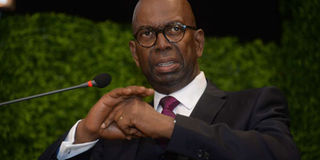Kenya wants to replace Bob Collymore with a local at Safaricom

Safaricom Chief Executive Officer Bob Collymore at a media briefing in 2018. PHOTO | FILE | NATION MEDIA GROUP
What you need to know:
Reuters reported on Monday that a row has erupted at the giant telco after the Kenyan government insisted that Mr Collymore should be succeeded by a Kenyan.
Mr Collymore took a medical leave in 2017 to fight cancer and it is understood that he wants to exit the firm.
Choosing a chief executive at Safaricom has always remained the preserve of Britain’s Vodafone which was the major shareholder in the firm until 2017.
Kenya wants the next chief executive of Safaricom to be a local after Bob Collymore steps down in August because of health reasons.
Reuters reported on Monday that a row has erupted at the giant telco after the Kenyan government insisted that Mr Collymore should be succeeded by a Kenyan, delaying the announcement of his replacement.
THE BOARD
But Safaricom Board Chairman Nicholas Nganga on Tuesday said the board has not made a decision on the matter.
"This will be subject of deliberation by the board and once a decision is made it will be communicated at the appropriate time," Nganga said in a statement.
He said the board has in place a robust recruitment process that adheres to global best practice in identifying and appointing senior leadership team.
"I am happy to report that the board is encouraged by the quick recovery of Bob Collymore who remains firmly in charge and is doing a great job of leading our company and delivering on our purpose of transforming lives."
Mr Collymore took a medical leave in 2017 to fight cancer and it is understood that he wants to exit the firm.
Safaricom’s stronghold on Kenya’s economy has been cemented by its mobile money platform M-Pesa that has now been classified as a risk to the economy if it collapses.
The firm, listed on the Nairobi Securities Exchange (NSE), has more than 30 million customers and generates over Sh200 billion in revenues every year.
The telco has become critical in fighting crime as well as helping police with investigations given its reach.
Choosing a chief executive at Safaricom has always remained the preserve of Britain’s Vodafone, which was the major shareholder in the firm until 2017.
SHARE SWAP
It transferred this powers to South Africa’s Vodacom after a share swap in 2017, which saw it remain with a five per cent stake, while the South African firm ended up with a 35 per cent stake.
Sources familiar with goings-on at the Safaricom boardroom told the Nation that the Kenyan government through the Treasury approved the 2017 share swap to South Africa’s Vodacom on condition that they will be allowed to have a say in the appointment of the man or woman who takes over the corner office at the telco.
The Kenyan government also has 35 per cent share, similar to what South Africa’s Vodacom has, and without merging the shareholding, they have equal shareholder strength.





